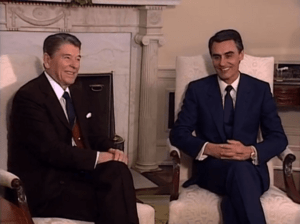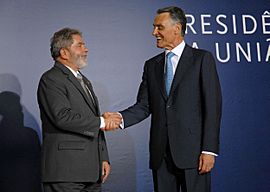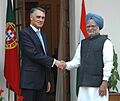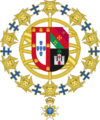Aníbal Cavaco Silva facts for kids
Quick facts for kids
Aníbal Cavaco Silva
|
|
|---|---|
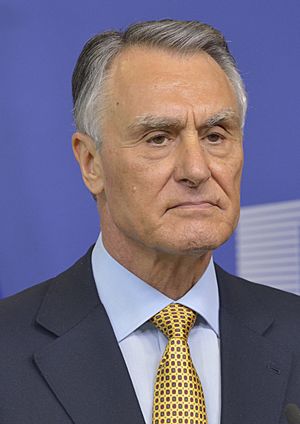
Cavaco Silva in 2013
|
|
| 19th President of Portugal | |
| In office 9 March 2006 – 9 March 2016 |
|
| Prime Minister | José Sócrates Pedro Passos Coelho António Costa |
| Preceded by | Jorge Sampaio |
| Succeeded by | Marcelo Rebelo de Sousa |
| Prime Minister of Portugal | |
| In office 6 November 1985 – 25 October 1995 |
|
| President | António Ramalho Eanes Mário Soares |
| Deputy | Eurico de Melo |
| Preceded by | Mário Soares |
| Succeeded by | António Guterres |
| President of the Social Democratic Party | |
| In office 19 May 1985 – 19 February 1995 |
|
| Secretary-General | Manuel Dias Loureiro José Falcão e Cunha José Nunes Liberato |
| Preceded by | Rui Machete |
| Succeeded by | Fernando Nogueira |
| Minister of Finance | |
| In office 3 January 1980 – 9 January 1981 |
|
| Prime Minister | Francisco Sá Carneiro |
| Preceded by | António de Sousa Franco |
| Succeeded by | João Morais Leitão |
| Member of the Assembly of the Republic | |
| In office 4 November 1985 – 12 August 1987 |
|
| Constituency | Lisbon |
| Personal details | |
| Born |
Aníbal António Cavaco Silva
15 July 1939 Boliqueime, Portugal |
| Political party | Social Democratic Party (since 1974) |
| Spouses |
Maria Cavaco Silva
(m. 1963) |
| Children | 2 |
| Alma mater | Technical University of Lisbon Alcuin College, York |
| Signature | |
Aníbal António Cavaco Silva (born 15 July 1939) is a Portuguese economist (an expert in money and business) and politician. He was the 19th President of Portugal from 2006 to 2016. Before that, he served as the Prime Minister of Portugal from 1985 to 1995.
His time as prime minister was the longest for any freely elected leader in Portugal's modern history. He was the first prime minister to win an absolute majority in parliament, which means his party had more than half of the seats. This gave him strong support to pass laws. He is best known for helping Portugal join the European Union.
Contents
Early Life and Education
Aníbal António Cavaco Silva was born in a small town called Boliqueime in the Algarve region of Portugal. As a young boy, he was not a top student. When he was 12, he had to repeat a grade. As a punishment, his grandfather made him work on a farm.
After this experience, he returned to school and became a much better student. He moved to Lisbon to study accounting. He also went to a university and earned a degree in economics and finance in 1964 with high marks. While studying, he was also a talented athlete in track and field.
From 1963 to 1964, he served in the Portuguese Army in Portuguese Mozambique. Later, he continued his studies at the University of York in England. When he returned to Portugal, he worked as a professor at several universities and as a director at the Bank of Portugal.
Political Career
Becoming Prime Minister
Cavaco Silva joined the Social Democratic Party (PSD) in 1974. By 1985, he became the leader of the party. In the 1985 election, his party won the most seats in the Assembly of the Republic, Portugal's parliament. This made him the new prime minister.
At first, he led a minority government. This meant his party did not have more than half of the seats in parliament. To pass laws, he needed help from other parties. For two years, his government helped Portugal's economy grow.
Winning a Majority
In 1987, another political party stopped supporting him. This led to a new election. This time, Cavaco Silva's party won a huge victory. They received over 50% of the vote and won 148 out of 250 seats. This was the first time a single party had won a majority since Portugal became a democracy in 1974.
With a strong majority, his government made big changes to Portugal's economy. In the 1991 election, his party won an even larger majority. He chose not to run for prime minister again in 1995.
Running for President
After leaving his role as prime minister, Cavaco Silva ran for president in 1996 but lost to Jorge Sampaio. He then stepped away from politics for a while. He worked as an advisor to the Bank of Portugal and taught at the Catholic University of Portugal.
President of Portugal
In 2005, Cavaco Silva announced he would run for president again. In January 2006, he won the election with over 50% of the vote. He became the first president from a center-right party in Portugal in over 30 years. He was sworn in on March 9, 2006.
As president, he worked closely with the government led by Socialist Prime Minister José Sócrates. He called their teamwork "strategic cooperation." In 2011, he was reelected for a second five-year term as president.
2015 Government Challenge
A difficult moment happened after the 2015 election. The government in power lost its majority in parliament. However, the prime minister's party was still the largest single party. President Cavaco Silva asked the prime minister, Pedro Passos Coelho, to try to form a new government.
Cavaco Silva said he did not want a government that included parties that were against the European Union and NATO. This decision was controversial. Other political leaders felt the president was interfering with the parliament's power. Eventually, the new government lost a vote in parliament. Cavaco Silva then appointed António Costa, the leader of the Socialist Party, as the new prime minister.
Family and Personal Life
Cavaco Silva married Maria Alves da Silva in 1963. They have two children, a daughter named Patricia and a son named Bruno. He also has five grandchildren. One of his grandsons, António Montez, is a professional soccer player.
Images for kids
-
President Aníbal Cavaco Silva with Indian Prime Minister Manmohan Singh in New Delhi, 2007
-
Aníbal Cavaco Silva's coat of arms as a knight of the Swedish Order of the Seraphim
See also
 In Spanish: Aníbal Cavaco Silva para niños
In Spanish: Aníbal Cavaco Silva para niños
- Liberalism in Portugal
 | Sharif Bey |
 | Hale Woodruff |
 | Richmond Barthé |
 | Purvis Young |


